Professional Identity Report: Skills, Competencies, and Development
VerifiedAdded on 2021/02/19
|8
|1965
|32
Report
AI Summary
This report examines professional identity within the context of Ledbury Restaurant, a UK-based hospitality organization. It explores the benefits of ongoing professional development for both employees and employers, highlighting how it enhances skills, employee engagement, and brand image. The report investigates the expectations of employers for key roles like head chef and manager, detailing required skills and competencies. The author, working as a head chef, assesses their own abilities using a personal skills audit and SWOT analysis, identifying strengths, weaknesses, opportunities, and threats. It reviews various learning theories and approaches, including Honey and Mumford's theory, VAK learning actions, and classical learning theory, with a preference for VAK. The report concludes with a critical evaluation of the author's skills and emphasizes the importance of continuous professional development for career advancement. References include books, journals and online resources.
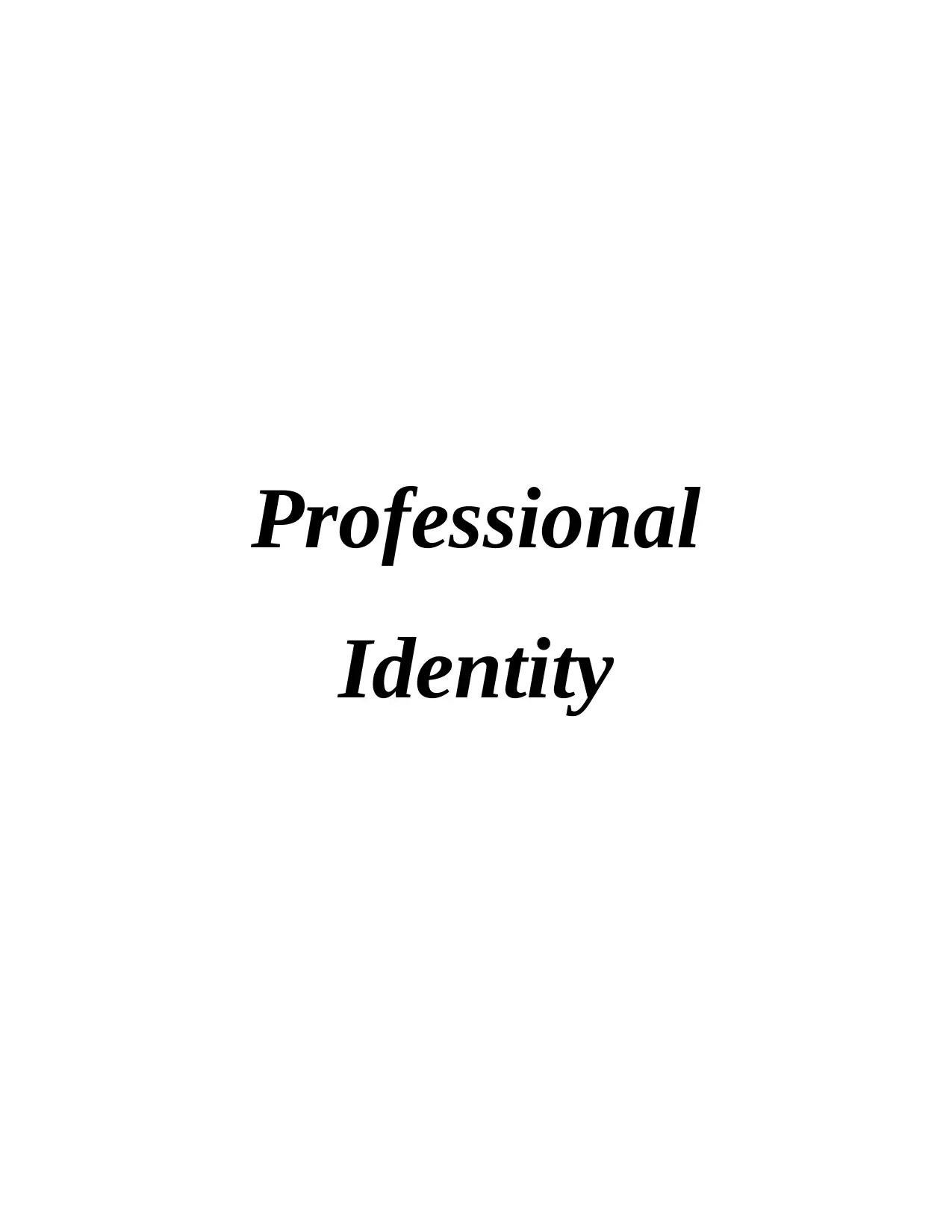
Professional
Identity
Identity
Paraphrase This Document
Need a fresh take? Get an instant paraphrase of this document with our AI Paraphraser
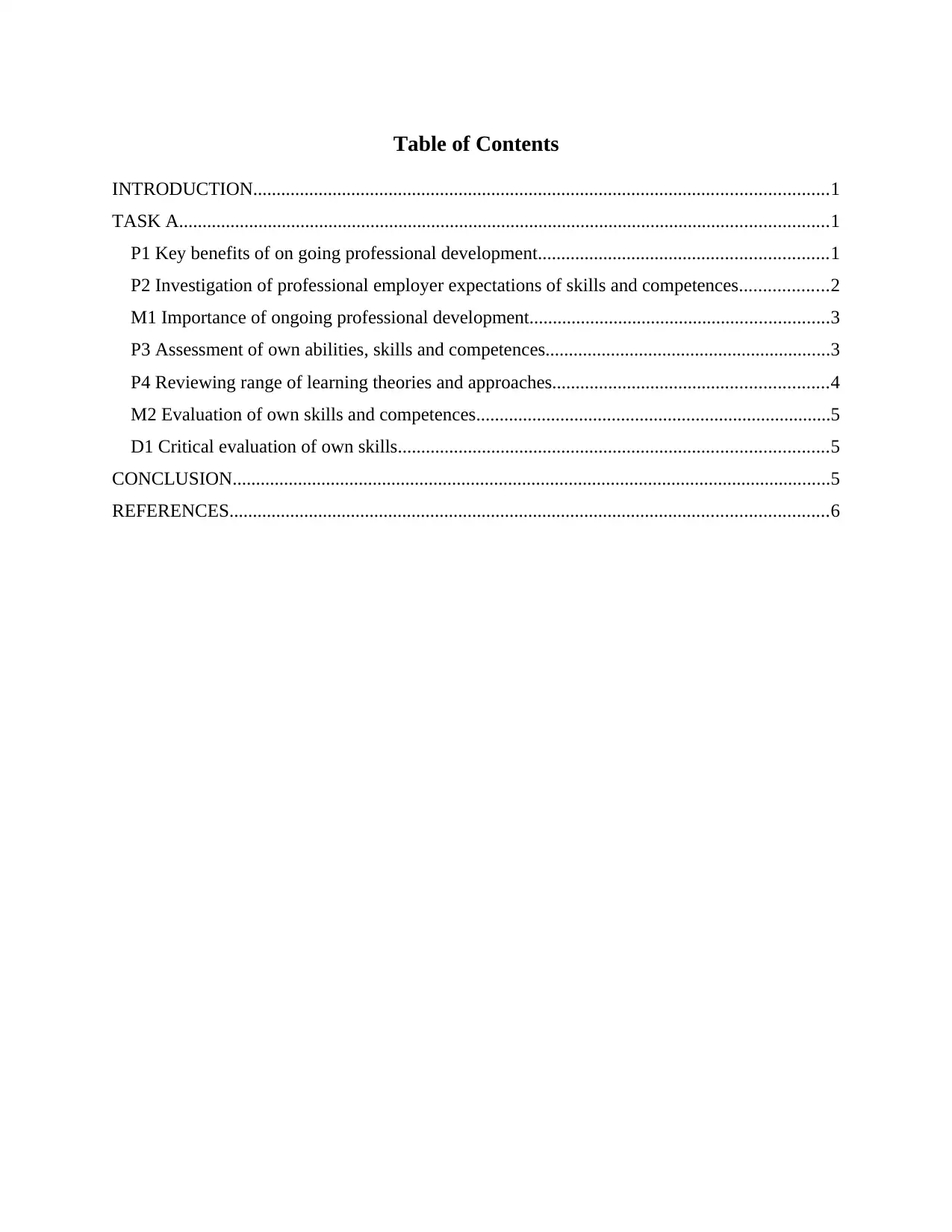
Table of Contents
INTRODUCTION...........................................................................................................................1
TASK A...........................................................................................................................................1
P1 Key benefits of on going professional development..............................................................1
P2 Investigation of professional employer expectations of skills and competences...................2
M1 Importance of ongoing professional development................................................................3
P3 Assessment of own abilities, skills and competences.............................................................3
P4 Reviewing range of learning theories and approaches...........................................................4
M2 Evaluation of own skills and competences............................................................................5
D1 Critical evaluation of own skills............................................................................................5
CONCLUSION................................................................................................................................5
REFERENCES................................................................................................................................6
INTRODUCTION...........................................................................................................................1
TASK A...........................................................................................................................................1
P1 Key benefits of on going professional development..............................................................1
P2 Investigation of professional employer expectations of skills and competences...................2
M1 Importance of ongoing professional development................................................................3
P3 Assessment of own abilities, skills and competences.............................................................3
P4 Reviewing range of learning theories and approaches...........................................................4
M2 Evaluation of own skills and competences............................................................................5
D1 Critical evaluation of own skills............................................................................................5
CONCLUSION................................................................................................................................5
REFERENCES................................................................................................................................6
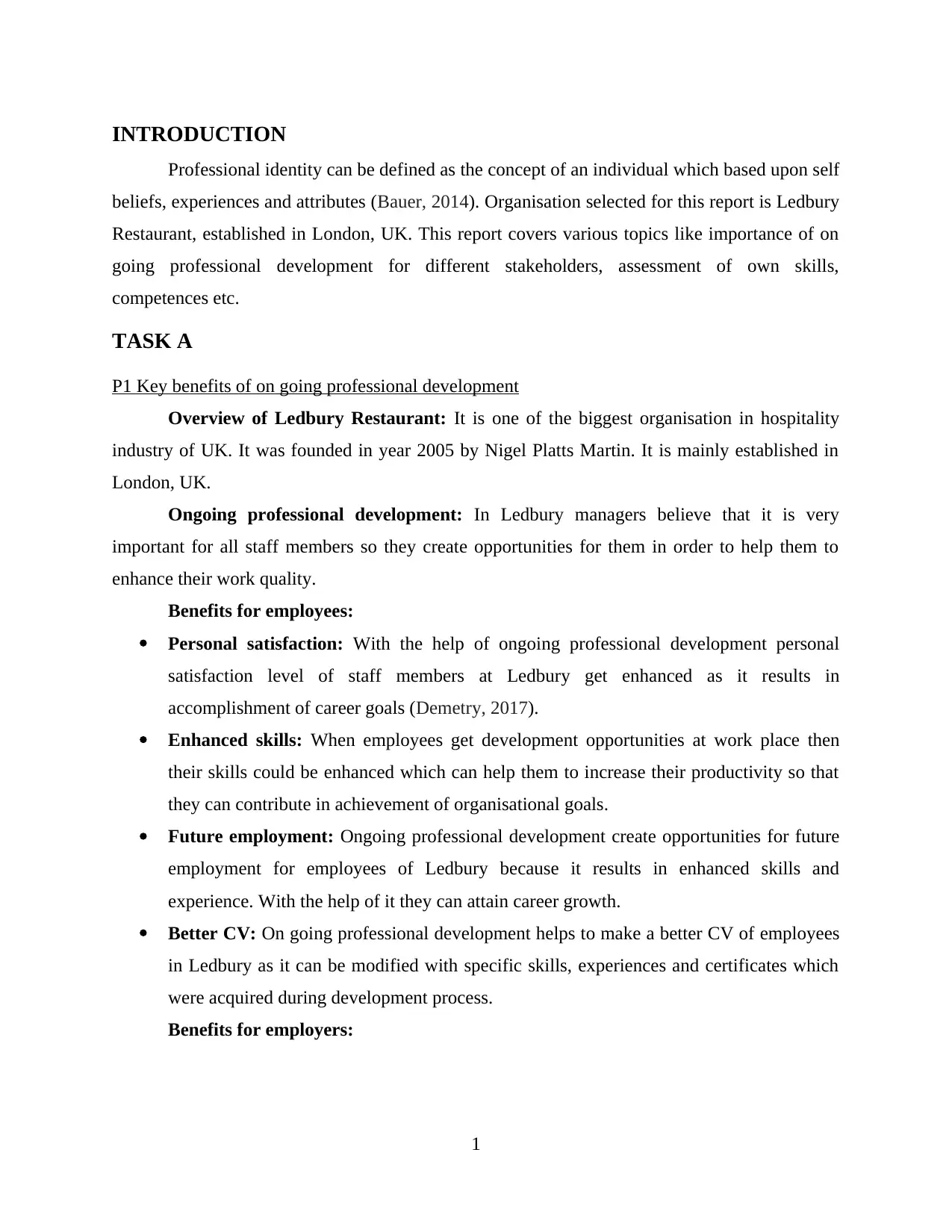
INTRODUCTION
Professional identity can be defined as the concept of an individual which based upon self
beliefs, experiences and attributes (Bauer, 2014). Organisation selected for this report is Ledbury
Restaurant, established in London, UK. This report covers various topics like importance of on
going professional development for different stakeholders, assessment of own skills,
competences etc.
TASK A
P1 Key benefits of on going professional development
Overview of Ledbury Restaurant: It is one of the biggest organisation in hospitality
industry of UK. It was founded in year 2005 by Nigel Platts Martin. It is mainly established in
London, UK.
Ongoing professional development: In Ledbury managers believe that it is very
important for all staff members so they create opportunities for them in order to help them to
enhance their work quality.
Benefits for employees:
Personal satisfaction: With the help of ongoing professional development personal
satisfaction level of staff members at Ledbury get enhanced as it results in
accomplishment of career goals (Demetry, 2017).
Enhanced skills: When employees get development opportunities at work place then
their skills could be enhanced which can help them to increase their productivity so that
they can contribute in achievement of organisational goals.
Future employment: Ongoing professional development create opportunities for future
employment for employees of Ledbury because it results in enhanced skills and
experience. With the help of it they can attain career growth.
Better CV: On going professional development helps to make a better CV of employees
in Ledbury as it can be modified with specific skills, experiences and certificates which
were acquired during development process.
Benefits for employers:
1
Professional identity can be defined as the concept of an individual which based upon self
beliefs, experiences and attributes (Bauer, 2014). Organisation selected for this report is Ledbury
Restaurant, established in London, UK. This report covers various topics like importance of on
going professional development for different stakeholders, assessment of own skills,
competences etc.
TASK A
P1 Key benefits of on going professional development
Overview of Ledbury Restaurant: It is one of the biggest organisation in hospitality
industry of UK. It was founded in year 2005 by Nigel Platts Martin. It is mainly established in
London, UK.
Ongoing professional development: In Ledbury managers believe that it is very
important for all staff members so they create opportunities for them in order to help them to
enhance their work quality.
Benefits for employees:
Personal satisfaction: With the help of ongoing professional development personal
satisfaction level of staff members at Ledbury get enhanced as it results in
accomplishment of career goals (Demetry, 2017).
Enhanced skills: When employees get development opportunities at work place then
their skills could be enhanced which can help them to increase their productivity so that
they can contribute in achievement of organisational goals.
Future employment: Ongoing professional development create opportunities for future
employment for employees of Ledbury because it results in enhanced skills and
experience. With the help of it they can attain career growth.
Better CV: On going professional development helps to make a better CV of employees
in Ledbury as it can be modified with specific skills, experiences and certificates which
were acquired during development process.
Benefits for employers:
1
⊘ This is a preview!⊘
Do you want full access?
Subscribe today to unlock all pages.

Trusted by 1+ million students worldwide
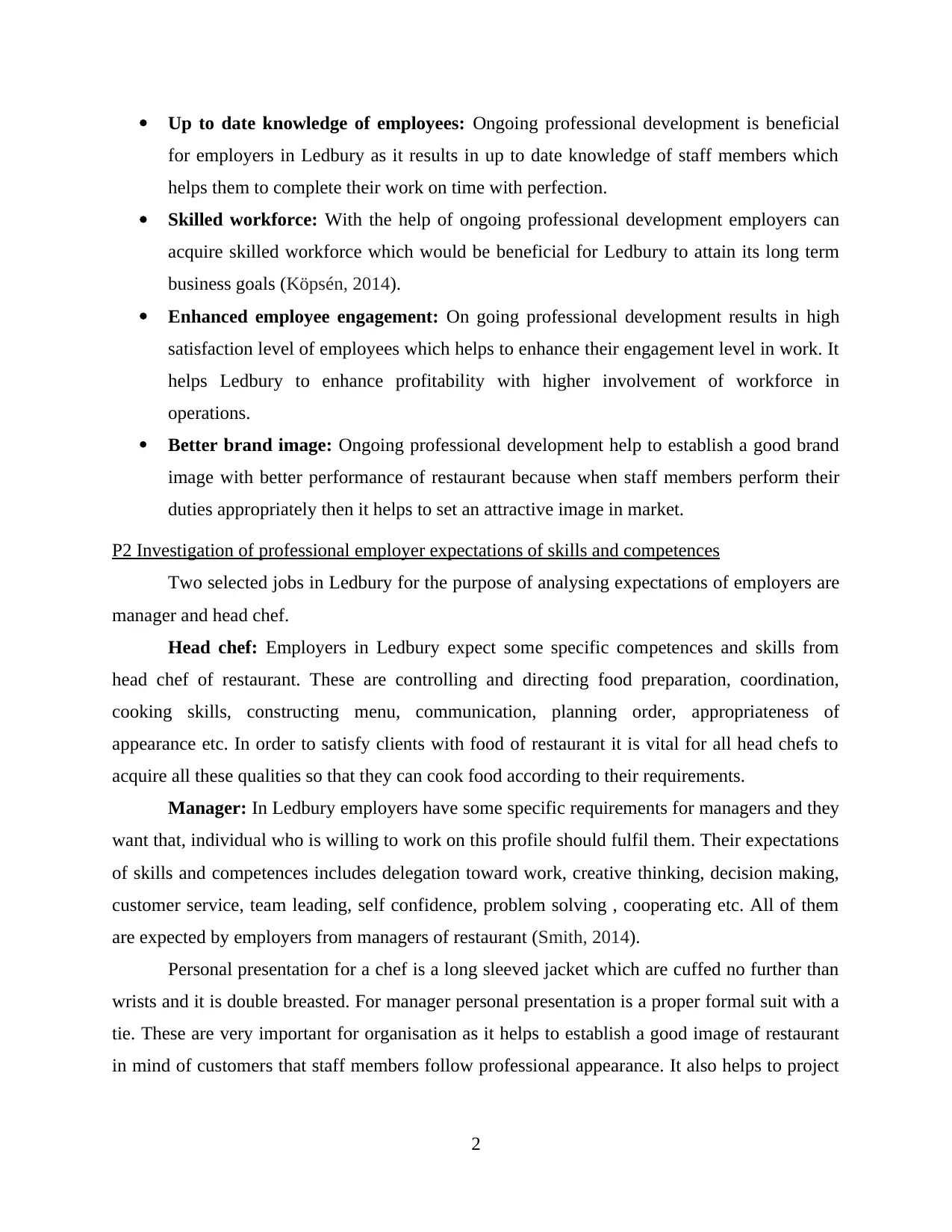
Up to date knowledge of employees: Ongoing professional development is beneficial
for employers in Ledbury as it results in up to date knowledge of staff members which
helps them to complete their work on time with perfection.
Skilled workforce: With the help of ongoing professional development employers can
acquire skilled workforce which would be beneficial for Ledbury to attain its long term
business goals (Köpsén, 2014).
Enhanced employee engagement: On going professional development results in high
satisfaction level of employees which helps to enhance their engagement level in work. It
helps Ledbury to enhance profitability with higher involvement of workforce in
operations.
Better brand image: Ongoing professional development help to establish a good brand
image with better performance of restaurant because when staff members perform their
duties appropriately then it helps to set an attractive image in market.
P2 Investigation of professional employer expectations of skills and competences
Two selected jobs in Ledbury for the purpose of analysing expectations of employers are
manager and head chef.
Head chef: Employers in Ledbury expect some specific competences and skills from
head chef of restaurant. These are controlling and directing food preparation, coordination,
cooking skills, constructing menu, communication, planning order, appropriateness of
appearance etc. In order to satisfy clients with food of restaurant it is vital for all head chefs to
acquire all these qualities so that they can cook food according to their requirements.
Manager: In Ledbury employers have some specific requirements for managers and they
want that, individual who is willing to work on this profile should fulfil them. Their expectations
of skills and competences includes delegation toward work, creative thinking, decision making,
customer service, team leading, self confidence, problem solving , cooperating etc. All of them
are expected by employers from managers of restaurant (Smith, 2014).
Personal presentation for a chef is a long sleeved jacket which are cuffed no further than
wrists and it is double breasted. For manager personal presentation is a proper formal suit with a
tie. These are very important for organisation as it helps to establish a good image of restaurant
in mind of customers that staff members follow professional appearance. It also helps to project
2
for employers in Ledbury as it results in up to date knowledge of staff members which
helps them to complete their work on time with perfection.
Skilled workforce: With the help of ongoing professional development employers can
acquire skilled workforce which would be beneficial for Ledbury to attain its long term
business goals (Köpsén, 2014).
Enhanced employee engagement: On going professional development results in high
satisfaction level of employees which helps to enhance their engagement level in work. It
helps Ledbury to enhance profitability with higher involvement of workforce in
operations.
Better brand image: Ongoing professional development help to establish a good brand
image with better performance of restaurant because when staff members perform their
duties appropriately then it helps to set an attractive image in market.
P2 Investigation of professional employer expectations of skills and competences
Two selected jobs in Ledbury for the purpose of analysing expectations of employers are
manager and head chef.
Head chef: Employers in Ledbury expect some specific competences and skills from
head chef of restaurant. These are controlling and directing food preparation, coordination,
cooking skills, constructing menu, communication, planning order, appropriateness of
appearance etc. In order to satisfy clients with food of restaurant it is vital for all head chefs to
acquire all these qualities so that they can cook food according to their requirements.
Manager: In Ledbury employers have some specific requirements for managers and they
want that, individual who is willing to work on this profile should fulfil them. Their expectations
of skills and competences includes delegation toward work, creative thinking, decision making,
customer service, team leading, self confidence, problem solving , cooperating etc. All of them
are expected by employers from managers of restaurant (Smith, 2014).
Personal presentation for a chef is a long sleeved jacket which are cuffed no further than
wrists and it is double breasted. For manager personal presentation is a proper formal suit with a
tie. These are very important for organisation as it helps to establish a good image of restaurant
in mind of customers that staff members follow professional appearance. It also helps to project
2
Paraphrase This Document
Need a fresh take? Get an instant paraphrase of this document with our AI Paraphraser
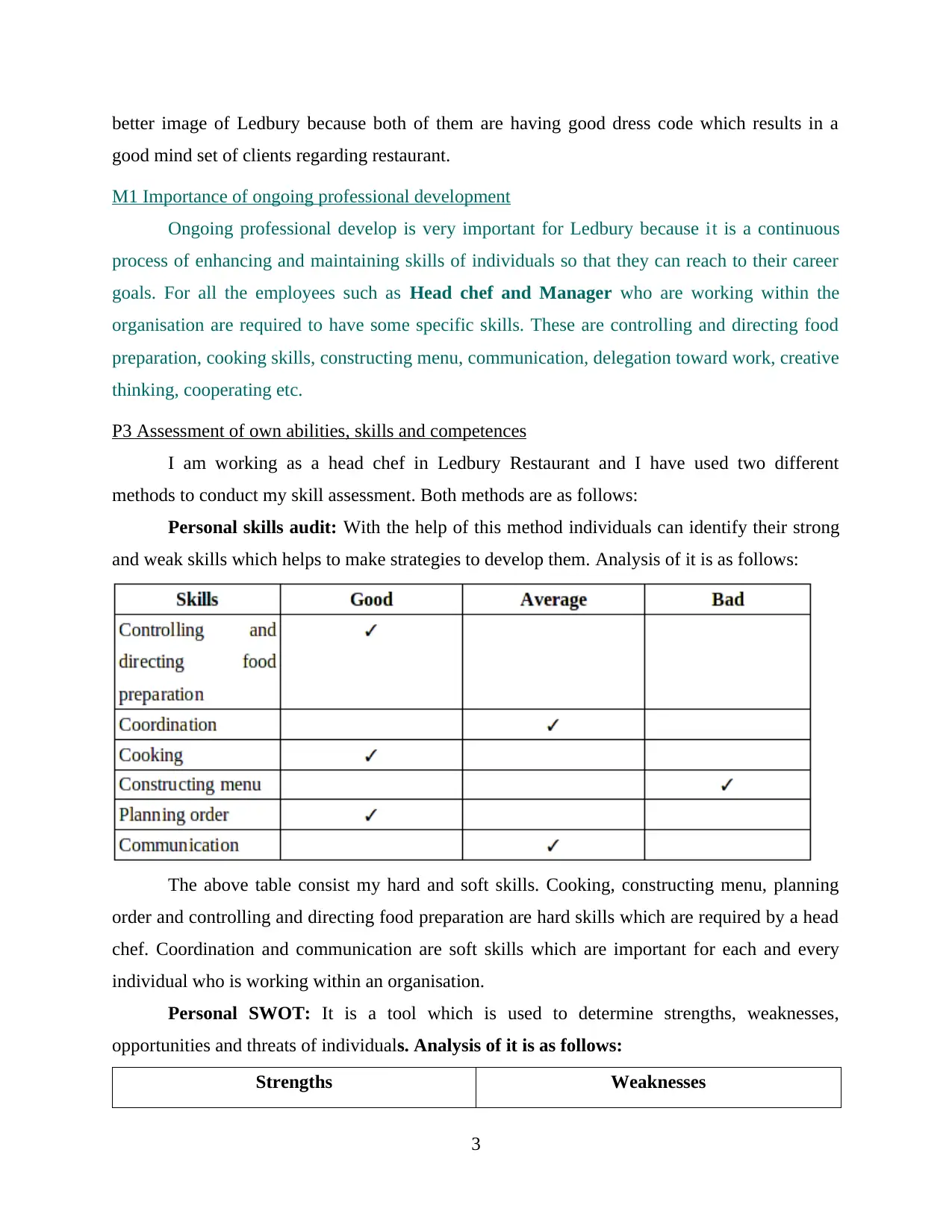
better image of Ledbury because both of them are having good dress code which results in a
good mind set of clients regarding restaurant.
M1 Importance of ongoing professional development
Ongoing professional develop is very important for Ledbury because it is a continuous
process of enhancing and maintaining skills of individuals so that they can reach to their career
goals. For all the employees such as Head chef and Manager who are working within the
organisation are required to have some specific skills. These are controlling and directing food
preparation, cooking skills, constructing menu, communication, delegation toward work, creative
thinking, cooperating etc.
P3 Assessment of own abilities, skills and competences
I am working as a head chef in Ledbury Restaurant and I have used two different
methods to conduct my skill assessment. Both methods are as follows:
Personal skills audit: With the help of this method individuals can identify their strong
and weak skills which helps to make strategies to develop them. Analysis of it is as follows:
The above table consist my hard and soft skills. Cooking, constructing menu, planning
order and controlling and directing food preparation are hard skills which are required by a head
chef. Coordination and communication are soft skills which are important for each and every
individual who is working within an organisation.
Personal SWOT: It is a tool which is used to determine strengths, weaknesses,
opportunities and threats of individuals. Analysis of it is as follows:
Strengths Weaknesses
3
good mind set of clients regarding restaurant.
M1 Importance of ongoing professional development
Ongoing professional develop is very important for Ledbury because it is a continuous
process of enhancing and maintaining skills of individuals so that they can reach to their career
goals. For all the employees such as Head chef and Manager who are working within the
organisation are required to have some specific skills. These are controlling and directing food
preparation, cooking skills, constructing menu, communication, delegation toward work, creative
thinking, cooperating etc.
P3 Assessment of own abilities, skills and competences
I am working as a head chef in Ledbury Restaurant and I have used two different
methods to conduct my skill assessment. Both methods are as follows:
Personal skills audit: With the help of this method individuals can identify their strong
and weak skills which helps to make strategies to develop them. Analysis of it is as follows:
The above table consist my hard and soft skills. Cooking, constructing menu, planning
order and controlling and directing food preparation are hard skills which are required by a head
chef. Coordination and communication are soft skills which are important for each and every
individual who is working within an organisation.
Personal SWOT: It is a tool which is used to determine strengths, weaknesses,
opportunities and threats of individuals. Analysis of it is as follows:
Strengths Weaknesses
3
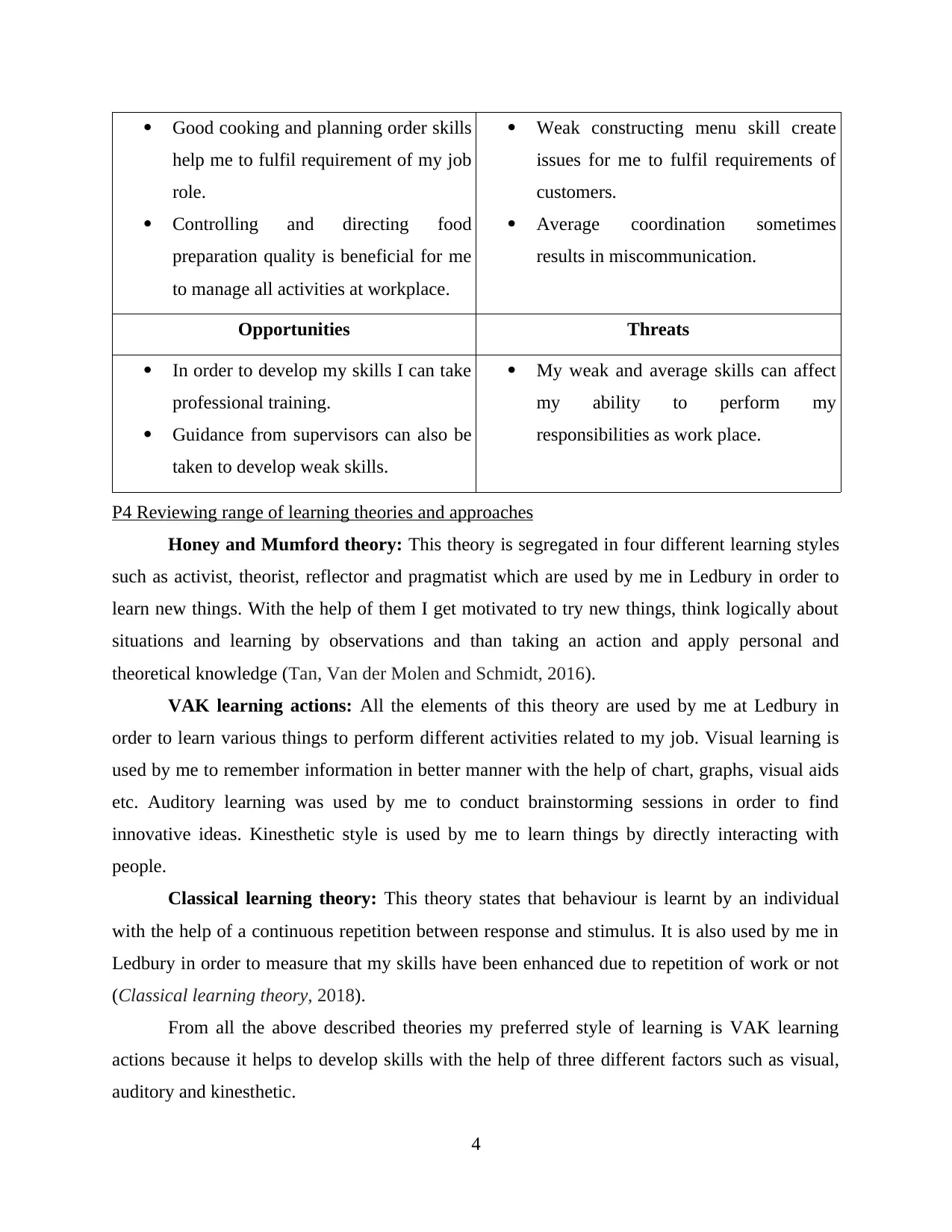
Good cooking and planning order skills
help me to fulfil requirement of my job
role.
Controlling and directing food
preparation quality is beneficial for me
to manage all activities at workplace.
Weak constructing menu skill create
issues for me to fulfil requirements of
customers.
Average coordination sometimes
results in miscommunication.
Opportunities Threats
In order to develop my skills I can take
professional training.
Guidance from supervisors can also be
taken to develop weak skills.
My weak and average skills can affect
my ability to perform my
responsibilities as work place.
P4 Reviewing range of learning theories and approaches
Honey and Mumford theory: This theory is segregated in four different learning styles
such as activist, theorist, reflector and pragmatist which are used by me in Ledbury in order to
learn new things. With the help of them I get motivated to try new things, think logically about
situations and learning by observations and than taking an action and apply personal and
theoretical knowledge (Tan, Van der Molen and Schmidt, 2016).
VAK learning actions: All the elements of this theory are used by me at Ledbury in
order to learn various things to perform different activities related to my job. Visual learning is
used by me to remember information in better manner with the help of chart, graphs, visual aids
etc. Auditory learning was used by me to conduct brainstorming sessions in order to find
innovative ideas. Kinesthetic style is used by me to learn things by directly interacting with
people.
Classical learning theory: This theory states that behaviour is learnt by an individual
with the help of a continuous repetition between response and stimulus. It is also used by me in
Ledbury in order to measure that my skills have been enhanced due to repetition of work or not
(Classical learning theory, 2018).
From all the above described theories my preferred style of learning is VAK learning
actions because it helps to develop skills with the help of three different factors such as visual,
auditory and kinesthetic.
4
help me to fulfil requirement of my job
role.
Controlling and directing food
preparation quality is beneficial for me
to manage all activities at workplace.
Weak constructing menu skill create
issues for me to fulfil requirements of
customers.
Average coordination sometimes
results in miscommunication.
Opportunities Threats
In order to develop my skills I can take
professional training.
Guidance from supervisors can also be
taken to develop weak skills.
My weak and average skills can affect
my ability to perform my
responsibilities as work place.
P4 Reviewing range of learning theories and approaches
Honey and Mumford theory: This theory is segregated in four different learning styles
such as activist, theorist, reflector and pragmatist which are used by me in Ledbury in order to
learn new things. With the help of them I get motivated to try new things, think logically about
situations and learning by observations and than taking an action and apply personal and
theoretical knowledge (Tan, Van der Molen and Schmidt, 2016).
VAK learning actions: All the elements of this theory are used by me at Ledbury in
order to learn various things to perform different activities related to my job. Visual learning is
used by me to remember information in better manner with the help of chart, graphs, visual aids
etc. Auditory learning was used by me to conduct brainstorming sessions in order to find
innovative ideas. Kinesthetic style is used by me to learn things by directly interacting with
people.
Classical learning theory: This theory states that behaviour is learnt by an individual
with the help of a continuous repetition between response and stimulus. It is also used by me in
Ledbury in order to measure that my skills have been enhanced due to repetition of work or not
(Classical learning theory, 2018).
From all the above described theories my preferred style of learning is VAK learning
actions because it helps to develop skills with the help of three different factors such as visual,
auditory and kinesthetic.
4
⊘ This is a preview!⊘
Do you want full access?
Subscribe today to unlock all pages.

Trusted by 1+ million students worldwide
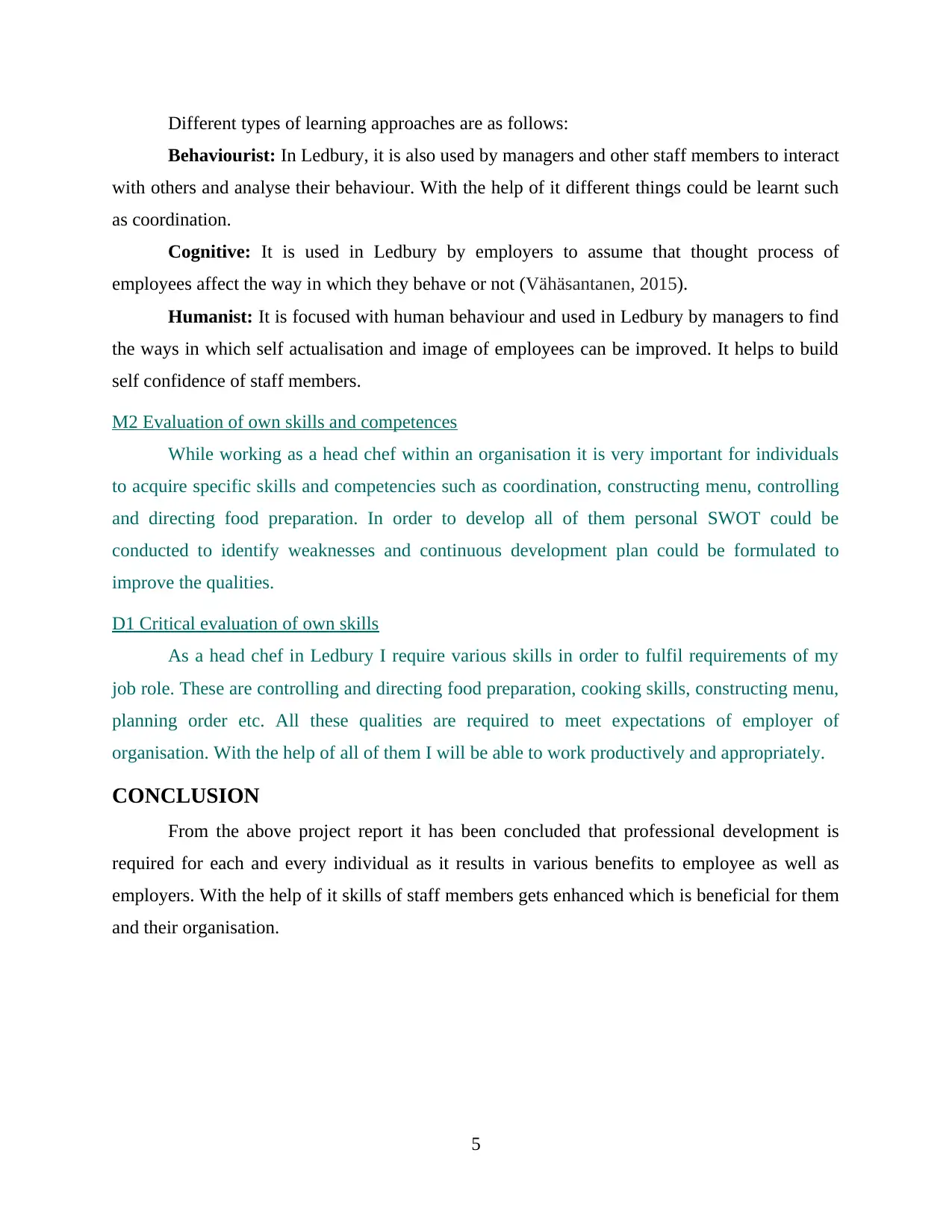
Different types of learning approaches are as follows:
Behaviourist: In Ledbury, it is also used by managers and other staff members to interact
with others and analyse their behaviour. With the help of it different things could be learnt such
as coordination.
Cognitive: It is used in Ledbury by employers to assume that thought process of
employees affect the way in which they behave or not (Vähäsantanen, 2015).
Humanist: It is focused with human behaviour and used in Ledbury by managers to find
the ways in which self actualisation and image of employees can be improved. It helps to build
self confidence of staff members.
M2 Evaluation of own skills and competences
While working as a head chef within an organisation it is very important for individuals
to acquire specific skills and competencies such as coordination, constructing menu, controlling
and directing food preparation. In order to develop all of them personal SWOT could be
conducted to identify weaknesses and continuous development plan could be formulated to
improve the qualities.
D1 Critical evaluation of own skills
As a head chef in Ledbury I require various skills in order to fulfil requirements of my
job role. These are controlling and directing food preparation, cooking skills, constructing menu,
planning order etc. All these qualities are required to meet expectations of employer of
organisation. With the help of all of them I will be able to work productively and appropriately.
CONCLUSION
From the above project report it has been concluded that professional development is
required for each and every individual as it results in various benefits to employee as well as
employers. With the help of it skills of staff members gets enhanced which is beneficial for them
and their organisation.
5
Behaviourist: In Ledbury, it is also used by managers and other staff members to interact
with others and analyse their behaviour. With the help of it different things could be learnt such
as coordination.
Cognitive: It is used in Ledbury by employers to assume that thought process of
employees affect the way in which they behave or not (Vähäsantanen, 2015).
Humanist: It is focused with human behaviour and used in Ledbury by managers to find
the ways in which self actualisation and image of employees can be improved. It helps to build
self confidence of staff members.
M2 Evaluation of own skills and competences
While working as a head chef within an organisation it is very important for individuals
to acquire specific skills and competencies such as coordination, constructing menu, controlling
and directing food preparation. In order to develop all of them personal SWOT could be
conducted to identify weaknesses and continuous development plan could be formulated to
improve the qualities.
D1 Critical evaluation of own skills
As a head chef in Ledbury I require various skills in order to fulfil requirements of my
job role. These are controlling and directing food preparation, cooking skills, constructing menu,
planning order etc. All these qualities are required to meet expectations of employer of
organisation. With the help of all of them I will be able to work productively and appropriately.
CONCLUSION
From the above project report it has been concluded that professional development is
required for each and every individual as it results in various benefits to employee as well as
employers. With the help of it skills of staff members gets enhanced which is beneficial for them
and their organisation.
5
Paraphrase This Document
Need a fresh take? Get an instant paraphrase of this document with our AI Paraphraser
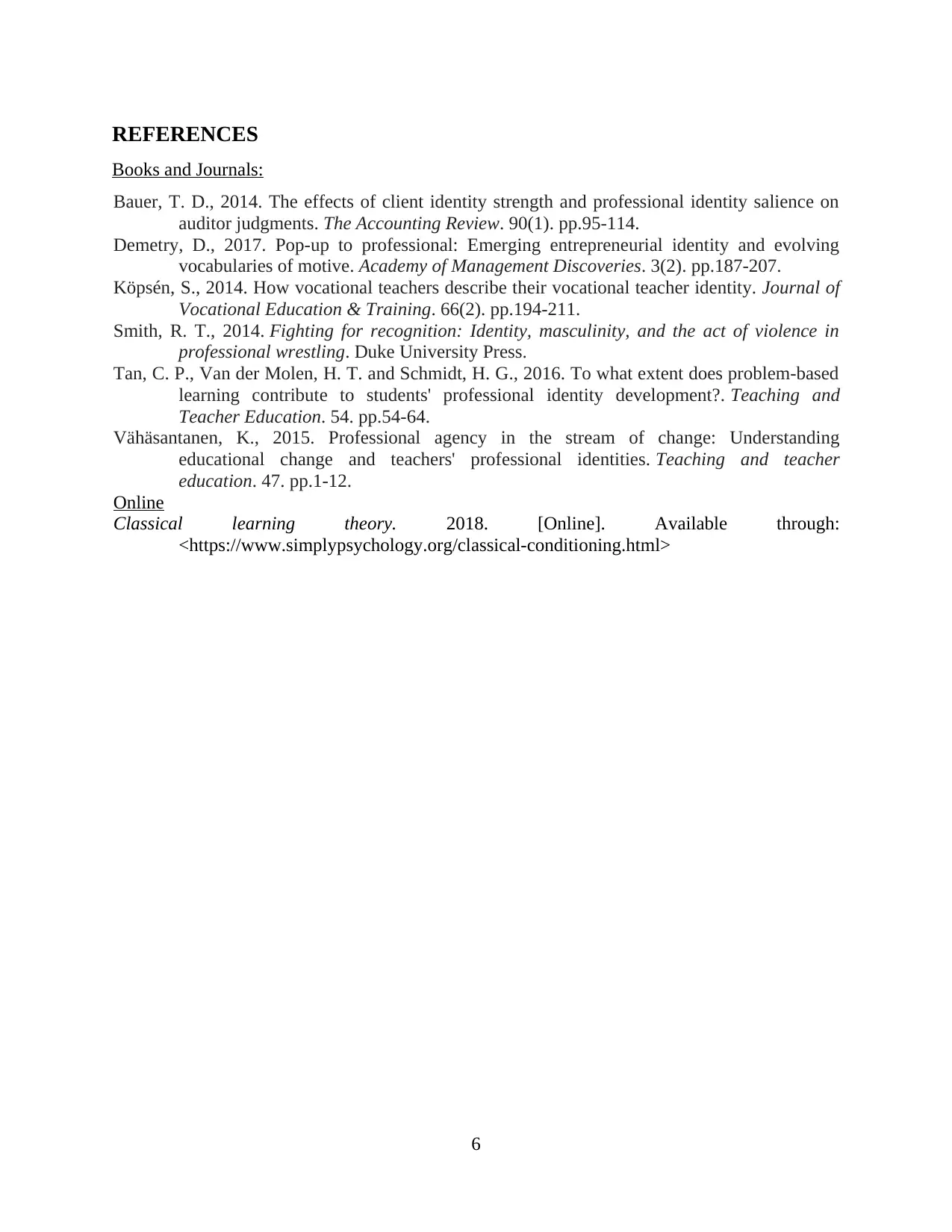
REFERENCES
Books and Journals:
Bauer, T. D., 2014. The effects of client identity strength and professional identity salience on
auditor judgments. The Accounting Review. 90(1). pp.95-114.
Demetry, D., 2017. Pop-up to professional: Emerging entrepreneurial identity and evolving
vocabularies of motive. Academy of Management Discoveries. 3(2). pp.187-207.
Köpsén, S., 2014. How vocational teachers describe their vocational teacher identity. Journal of
Vocational Education & Training. 66(2). pp.194-211.
Smith, R. T., 2014. Fighting for recognition: Identity, masculinity, and the act of violence in
professional wrestling. Duke University Press.
Tan, C. P., Van der Molen, H. T. and Schmidt, H. G., 2016. To what extent does problem-based
learning contribute to students' professional identity development?. Teaching and
Teacher Education. 54. pp.54-64.
Vähäsantanen, K., 2015. Professional agency in the stream of change: Understanding
educational change and teachers' professional identities. Teaching and teacher
education. 47. pp.1-12.
Online
Classical learning theory. 2018. [Online]. Available through:
<https://www.simplypsychology.org/classical-conditioning.html>
6
Books and Journals:
Bauer, T. D., 2014. The effects of client identity strength and professional identity salience on
auditor judgments. The Accounting Review. 90(1). pp.95-114.
Demetry, D., 2017. Pop-up to professional: Emerging entrepreneurial identity and evolving
vocabularies of motive. Academy of Management Discoveries. 3(2). pp.187-207.
Köpsén, S., 2014. How vocational teachers describe their vocational teacher identity. Journal of
Vocational Education & Training. 66(2). pp.194-211.
Smith, R. T., 2014. Fighting for recognition: Identity, masculinity, and the act of violence in
professional wrestling. Duke University Press.
Tan, C. P., Van der Molen, H. T. and Schmidt, H. G., 2016. To what extent does problem-based
learning contribute to students' professional identity development?. Teaching and
Teacher Education. 54. pp.54-64.
Vähäsantanen, K., 2015. Professional agency in the stream of change: Understanding
educational change and teachers' professional identities. Teaching and teacher
education. 47. pp.1-12.
Online
Classical learning theory. 2018. [Online]. Available through:
<https://www.simplypsychology.org/classical-conditioning.html>
6
1 out of 8
Related Documents
Your All-in-One AI-Powered Toolkit for Academic Success.
+13062052269
info@desklib.com
Available 24*7 on WhatsApp / Email
![[object Object]](/_next/static/media/star-bottom.7253800d.svg)
Unlock your academic potential
Copyright © 2020–2026 A2Z Services. All Rights Reserved. Developed and managed by ZUCOL.





